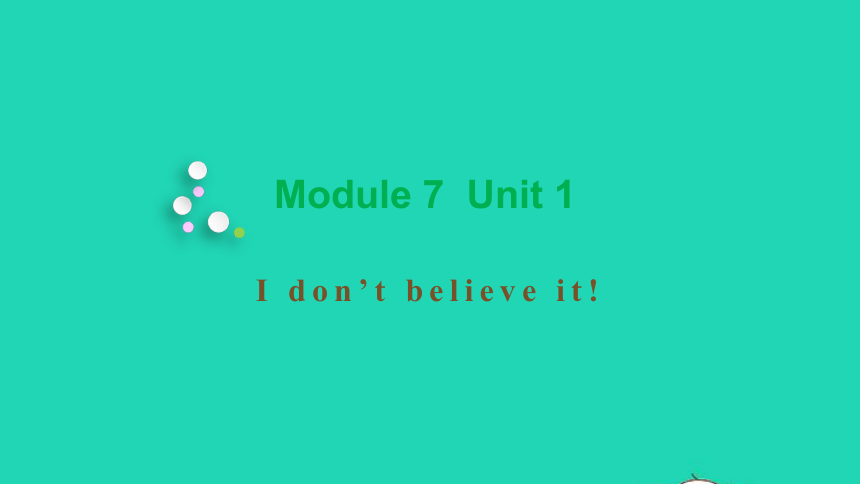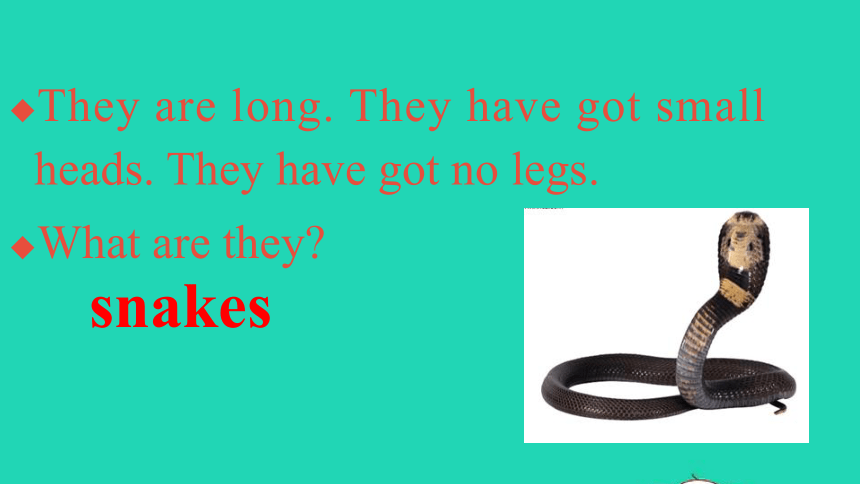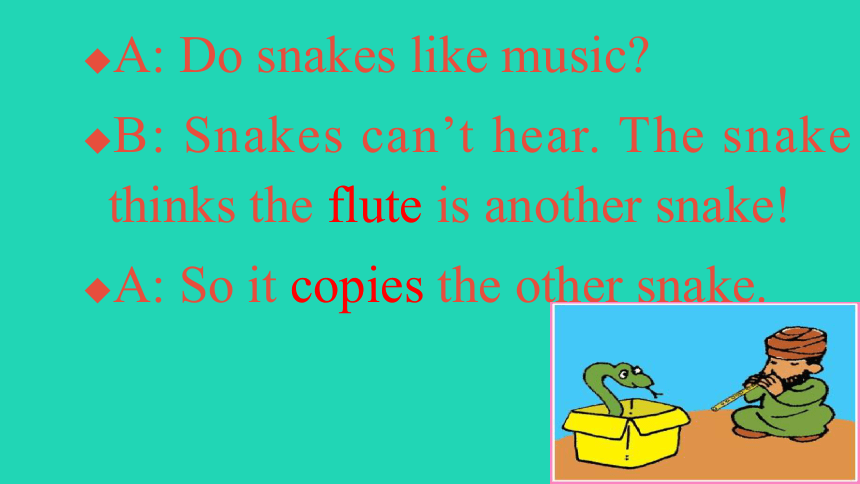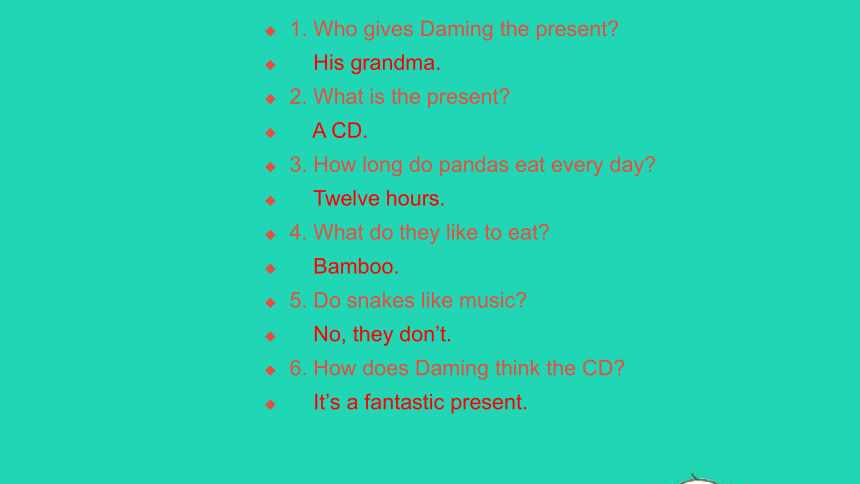外研版六年级英语上册Module7 Unit1 I don't believe it教学课件
文档属性
| 名称 | 外研版六年级英语上册Module7 Unit1 I don't believe it教学课件 |  | |
| 格式 | ppt | ||
| 文件大小 | 1.7MB | ||
| 资源类型 | 试卷 | ||
| 版本资源 | 外研版(三年级起点) | ||
| 科目 | 英语 | ||
| 更新时间 | 2022-01-24 09:28:50 | ||
图片预览







文档简介
(共19张PPT)
I don’t believe it!
Module 7 Unit 1
Let’s guess!
They are fat. They’re black and white.
They live in China. They love bamboo. What are they
pandas
Pandas eat for twelve hours a day.
Lucky pandas! They love bamboo.
They are long. They have got small heads. They have got no legs.
What are they
snakes
A: Do snakes like music
B: Snakes can’t hear. The snake thinks the flute is another snake!
A: So it copies the other snake.
Let’s answer the questions.
1. Who gives Daming the present
His grandma.
2. What is the present
A CD.
3. How long do pandas eat every day
Twelve hours.
4. What do they like to eat
Bamboo.
5. Do snakes like music
No, they don’t.
6. How does Daming think the CD
It’s a fantastic present.
I like cake.
I don’t like cake.
She likes cake.
She doesn’t like cake.
一般现在时的
肯定句,否定句
一般现在时
一般疑问句及其回答
A: Do you (like)…
B: Yes, I do. / No, I don’t.
apples
noodles
rice
fish
Ask and answer in pairs.
A: Do you like noodles
B: Yes, I do. / No, I don’t.
A: Do you like pandas
B: Yes, I do. / No, I don’t.
Talk about your partner.
I like…
We like…
I don’t like…
We don’t like…
She/He likes…
They like…
She/He doesn’t like…
They don’t like…
Talk about your partner. For example:
I like noodles. He likes noodles.
We like noodles.
I don’t like fish. He doesn’t like noodles.
We don’t like rice.
She likes apples. He likes apples.
They like apples.
She doesn’t like bananas. He doesn’t like bananas.
They don’t like bananas.
1/give Daming a present 中的give后接了两个宾语, Daming和a present。
Daming(人)是间接宾语,a present 是直接宾语。
若将直接宾语放在间接宾语前面,则需加一个介词
(to //for),这由前面的动词决定。
如give, show, send, bring 等动词要与to连用。
而buy, get, find, make, do 等动词与for 连用。
give sth. to sb. = give sb. sth.
give a present to Daming = give Daming a present
He gave me a book. = He gave a book to me.
I bought him a present.
= I bought a present for him.
注意:
若直接宾语是代词,一般不放在间接宾语之后,例如:
He sent it to me. 他把它寄给了我。
而不能是 He sent me it.
2/I believe it. 否定 I don’t believe it.
3/持续一段时间用介词for
eat for twelve hours
walk for two hours
4/Why is the snake coming out of the box
为什么蛇从盒子里钻出来?come out 出现,出来
why 的用法:
why是特殊疑问词,表示“为什么”,引起特殊疑问句,回答时用because。例如:
—Why do you like music
—Because it is relaxing.
—Why do you like Chinese
—Because it is interesting.
5/ What an interesting CD-ROM!
=How interesting the CD-ROM is!
what 引起的感叹句,what +名词
例如: What a nice boy!
how 引起的感叹句,how +形容词/副词
例如: How nice the boy is!
How hard it is!
6/ again and again 一次又一次
7/注意一些词形转换
1/ love 同义 like 2/ hour 同音 our
3/ day 反义 night 4/ picture 同义 photo
5/ for 同音 four 6/ hear 同音 here
7/ come 反义 go 8/ know 同音 no
9/ fantastic 同义 great 10/ interesting 同义 funny
11/ lucky 名词 luck 12/ box 复数 boxes
13/ can’t hear = deaf 14/ can’t see = blind
I don’t believe it!
Module 7 Unit 1
Let’s guess!
They are fat. They’re black and white.
They live in China. They love bamboo. What are they
pandas
Pandas eat for twelve hours a day.
Lucky pandas! They love bamboo.
They are long. They have got small heads. They have got no legs.
What are they
snakes
A: Do snakes like music
B: Snakes can’t hear. The snake thinks the flute is another snake!
A: So it copies the other snake.
Let’s answer the questions.
1. Who gives Daming the present
His grandma.
2. What is the present
A CD.
3. How long do pandas eat every day
Twelve hours.
4. What do they like to eat
Bamboo.
5. Do snakes like music
No, they don’t.
6. How does Daming think the CD
It’s a fantastic present.
I like cake.
I don’t like cake.
She likes cake.
She doesn’t like cake.
一般现在时的
肯定句,否定句
一般现在时
一般疑问句及其回答
A: Do you (like)…
B: Yes, I do. / No, I don’t.
apples
noodles
rice
fish
Ask and answer in pairs.
A: Do you like noodles
B: Yes, I do. / No, I don’t.
A: Do you like pandas
B: Yes, I do. / No, I don’t.
Talk about your partner.
I like…
We like…
I don’t like…
We don’t like…
She/He likes…
They like…
She/He doesn’t like…
They don’t like…
Talk about your partner. For example:
I like noodles. He likes noodles.
We like noodles.
I don’t like fish. He doesn’t like noodles.
We don’t like rice.
She likes apples. He likes apples.
They like apples.
She doesn’t like bananas. He doesn’t like bananas.
They don’t like bananas.
1/give Daming a present 中的give后接了两个宾语, Daming和a present。
Daming(人)是间接宾语,a present 是直接宾语。
若将直接宾语放在间接宾语前面,则需加一个介词
(to //for),这由前面的动词决定。
如give, show, send, bring 等动词要与to连用。
而buy, get, find, make, do 等动词与for 连用。
give sth. to sb. = give sb. sth.
give a present to Daming = give Daming a present
He gave me a book. = He gave a book to me.
I bought him a present.
= I bought a present for him.
注意:
若直接宾语是代词,一般不放在间接宾语之后,例如:
He sent it to me. 他把它寄给了我。
而不能是 He sent me it.
2/I believe it. 否定 I don’t believe it.
3/持续一段时间用介词for
eat for twelve hours
walk for two hours
4/Why is the snake coming out of the box
为什么蛇从盒子里钻出来?come out 出现,出来
why 的用法:
why是特殊疑问词,表示“为什么”,引起特殊疑问句,回答时用because。例如:
—Why do you like music
—Because it is relaxing.
—Why do you like Chinese
—Because it is interesting.
5/ What an interesting CD-ROM!
=How interesting the CD-ROM is!
what 引起的感叹句,what +名词
例如: What a nice boy!
how 引起的感叹句,how +形容词/副词
例如: How nice the boy is!
How hard it is!
6/ again and again 一次又一次
7/注意一些词形转换
1/ love 同义 like 2/ hour 同音 our
3/ day 反义 night 4/ picture 同义 photo
5/ for 同音 four 6/ hear 同音 here
7/ come 反义 go 8/ know 同音 no
9/ fantastic 同义 great 10/ interesting 同义 funny
11/ lucky 名词 luck 12/ box 复数 boxes
13/ can’t hear = deaf 14/ can’t see = blind
同课章节目录
- Module 1
- Unit 1 It's more than twenty thousand kilometers l
- Unit 2 It's in the west.
- Module 2
- Unit 1 There's Chinese dancing.
- Unit 2 There are lots of beautiful lakes in China.
- Module 3
- Unit 1 Collecting stamps is my hobby.
- Unit 2 What's your hobby?
- Module 4
- Unit 1 Thanksgiving is my favourite festival.
- Unit 2 Our favourite festival is the Spring Festiv
- Module 5
- Unit 1 Can you be my Chinese pen friend?
- Unit 2 I can speak French.
- Module 6
- Unit 1 You've got a letter from New York.
- Unit 2 I've got a stamp from China.
- Module 7
- Unit 1 I don't believe it.
- Unit 2 Pandas love bamboo.
- Module 8
- Unit 1 Do you often play with dolls?
- Unit 2 I often go swimming.
- Module 9
- Unit 1 Do you want to visit the UN building?
- Unit 2 I want to go to Shanghai.
- Review Module
- Unit 1
- Unit 2
- Module 10
- Unit 1 Don't talk in the library.
- Unit 2 Go straight on!
